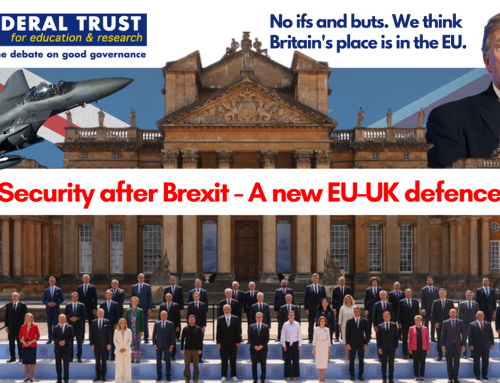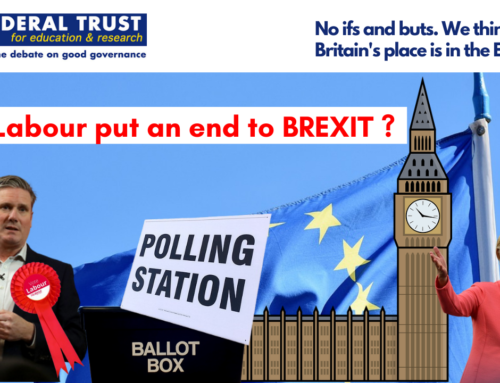by John Leech, Council Member, The Federal Trust
25th October 2019
The People’s Vote would be the third time that the British public has been asked for their opinion on membership of a united Europe: In 1975, two years after joining the European Communities, to confirm that act; in 2016, whether to remain or not in the meanwhile consolidated European Union; and now, once more a confirmatory vote of the conditions of withdrawal, with the option to remain. In between came the Alternative Vote Referendum of May 2011 which also included Boundary Changes, and might have had an effect on future referendums had it not failed.
This history is in itself a caution of the impermanence of public mood and opinion, and the shortcomings of the process of soliciting it. Eastern philosophy holds, ‘You never step into the same River twice’; the same is true of the composition of the electorate, even over a few short years. But before undertaking it for a third time, there needs to be clarity on what has shaped that opinion and how precisely one could ensure that a vote represents a sincere conviction rather than a passing dissatisfaction. In other words, are the parameters of a referendum fit for the purpose, or how could they be made so?
Is a People’s Vote winnable?
From the moment that the 2016 Referendum was announced to the present day, the initiative and momentum have rested largely with the Leave campaign. It is they whose constant opposition over the intervening years had fanned the flames for change, whose misinformation and ‘fake news’ then riveted attention and have continued to dominate the headlines.
From then on, the fervour of many Leave campaigners has become consolidated, even in denial of dire predictions from neutral and official sources of the punishing effects that severing ties with the EU would entrain, let alone an abrupt departure without agreed conditions. To great sections of its followers, Leave has assumed the exciting guise of a family bear-hunt; they may no longer wish to be deprived of the adventure.
Sober reflection, of which there was little to begin with, appears to have made little co-ordinated impact since. Nor has there been an organised campaign to compensate for the poverty of knowledge about the EU, its rationale and its achievements. Contrary to 1975, when major economic studies had been released on each of the fundamental problems posed, no formal information was provided in 2016 or since of the benefits of EU membership for the economy, its support for scientific and social programmes, or its underpinning of Britain’s standing in the world. Despite having invited the people to vote, the Government allowed itself to be prevented from supporting its own case with the facts on which voters might base an opinion. Not only was the EU’s Information Office in the UK silenced, but HMG’s own services were inhibited from presenting factual background briefings by protests alleging infringement of a mythical ‘level playing field’.
The maximum the Government could do was to circulate a pamphlet to households under the title, “Why the Government believes that voting to remain in the European Union is the best decision for the UK.” Despite adding the statement that “This is your decision. The Government will implement what you decide”, the High Court subsequently ruled that the Referendum Act had made no provision for the result to be binding on the Government or any future Government, nor could it be owing to the constitutional principles of parliamentary sovereignty. Neither did that Act require more than a simple majority, not a super majority, a double majority of constituent countries, or a minimum turnout threshold – despite its profound constitutional significance.
Clearly there is no prospect that the current – or any currently imaginable successor government – will be allowed to make good that fundamental failure to aid a People’s Vote. Voters would therefore once more go to the polls with only Leave battle-cries ringing in their ears, unless they have taken the trouble to seek out the facts for themselves. The People’s Vote may seem a grand opportunity to right the failures of the Referendum, but the ground rules have not changed enough to assure a different result.
Objective, Reach and Definition
The 2016 Referendum was officially declared as being ‘Advisory’. In the comfortable expectation of an endorsement of the status quo, Government responsibility to act upon its result was deemed discretionary. Furthermore, though the question appeared purposeful and direct, it allowed a multiplicity of personal interpretations and conclusions. In the event, all shadings of the result were swept away by outright victory and the passions inflamed as the campaign ran its lopsided course.
Now, in the cold light of three years of attempts lawfully to disentangle Britain from its uneasy nestling in Europe, the essence of a second Vote can be seen as abrogation of the 1972 Treaty of the UK’s accession to the EU. Three years of tortuous and inconclusive negotiations have shown that this is an international Treaty of such depth and significance to both parties that it is frivolous to claim that it is all simply a matter for the British electorate to decide. To begin with, international convention is that the import of such litigation is so wide-ranging as to make it a constitutional question which would have required something more formal than a simple majority.
It is of interest to note that the debate about British sovereignty in the 1970s had been quite as searching as today‘s. But the Government of the day, having listed the areas where the Treaty would impinge on British freedoms, decided that it was advisable “to put considerations of Britain’s power and influence in the world before those of formal sovereignty.“ The 1975 Referendum again confirmed this judgment.
There is, of course, no way for the existing Referendum to be overturned – other than by a second Vote, or a General Election won on an unassailable manifesto to remain. However, given the ramifications of Brexit and the damages it will inflict on both sides, it seems justifiable that any new accommodation with the EU should include agreement on the conditions under which a new Vote is to be held and acted upon. It is significant that, on the EU side, all decisions affecting withdrawal of a Member State require not just a qualified majority but unanimity. Now that the intricacy of severance and its dire national and international consequences are plain, any Withdrawal Agreement forming a basis for the Vote should require it to be subject not only to a minimum voter participation but also to reflect and honour the choices of the UK’s constituent countries. This would be of vital importance for the acceptance of the result by the public, by Parliament and, finally, for the settlement of the ‘European Question’ for good.
The Ballot Paper
There will be a temptation to use the opportunity of a nation-wide Vote to settle a number of other issues, even if unrelated. Such a plebiscite on local issues might prompt more people to come to the polls, but they would equally pose a hazard by deflecting attention from the core issue.
The process of negotiating a withdrawal with the EU will have been tested several times over, with largely marginal dents in the fundamental positions. The latest version to be offered to Parliament would therefore be regarded as definitive, even if marginal textual adjustments were to be made subsequently for procedural reasons. The Question should therefore be stated unequivocally as ‘Leave on the terms negotiated under the final Withdrawal Agreement, or Remain’.
Making the Leave vote subject to the terms of the Withdrawal Agreement would require the Electoral Commission to offer voters a summary of its terms and effects once ratified. That summary paper should include the essence of the Political Declaration, giving a view of the future relationship of an independent UK with a reduced EU.
Avoiding the gross errors of the 2016 Referendum, the procedures outlined above would ensure that a People’s Vote –
- Is not wasted through lack of meticulous preparation;
- Is calibrated to the gravity of the decision it demands; and above all
- does not carry within it the seeds of recurrent dissent as public opinion pivots once more to discontent.
The last of these requirements will in all circumstances be the most important. It will call for scrupulous preparation and unassailable evenhandedness. Preparation must rest in the first instance on clarifying the issues involved, beyond reasonable doubt, relying on absolute neutrality of the author. Since any Government agency will be heavily partisan, there is need for a formal source outside the official ambit.
Parliament, whilst not emerging in undisputed glory from the recent fray and tugs of war, nevertheless now stands in lonely supremacy; and that is where a solution may be sought. Parliament moreover possesses its own means of making sense of complex issues, often when even the participants themselves lack the clarity of expression needed for the printed word. The Hansard Society achieves this honour almost on a daily basis with its reporting of proceedings in Parliament. Never disputed once published, these are the written words of our parliamentary history.
What better way then, for the last formal word to be presented to the electorate to come from a parliamentary source than to let them vote on a question set down by a parliamentary authority, backed by an analysis prepared by parliamentary hands skilled in absolute impartiality?
Not as some politicians would have it, ‘Parliament against the People’, but rather, ‘A parliamentary umpire for the People’s Vote’.




